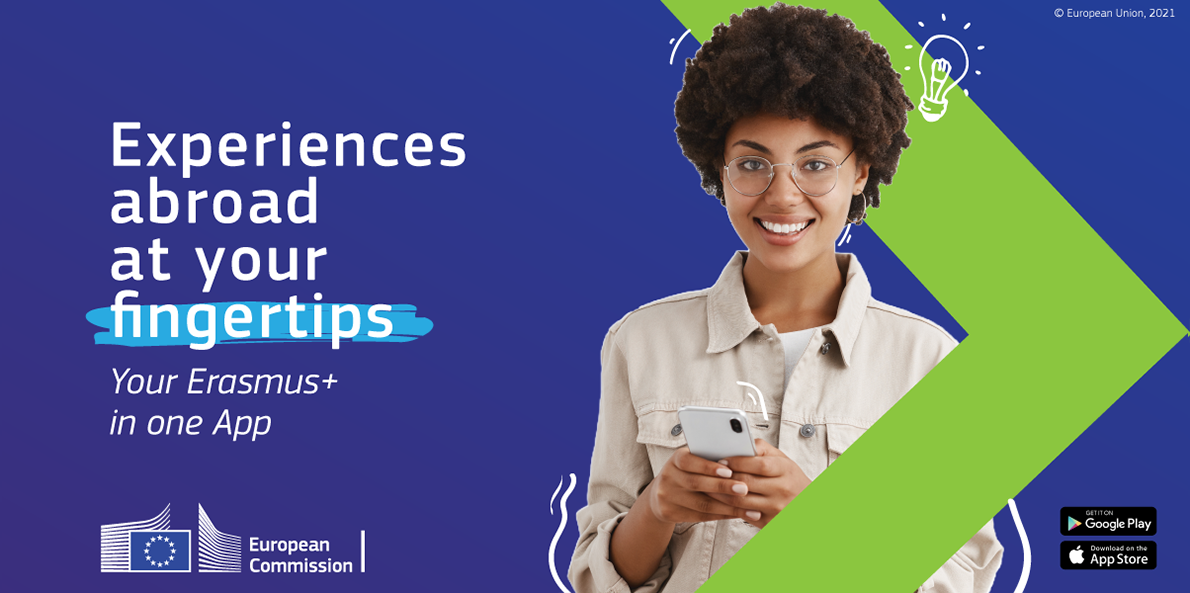
January 28th, 2021 saw the online launch event for the new Erasmus+ app, which gathered more than 2000 people, including representatives of the European Commission, student organisations, Erasmus+ National Agencies, higher education institutions, as well as students and academic staff from all over Europe. The attendees were able to learn the concrete ways students can benefit from the Erasmus+ app and its further development to support both students and universities.
Recording of the launch event can be found at the end of the article.
The event was opened by Tajana Mohnacki, Vice-President of the Erasmus Student Network, who welcomed the participants and gave the word to Themis Christophidou, Director-General for Education, Youth, Sport and Culture of the European Commission, and Mariya Gabriel, European Commissioner for Innovation, Research, Culture, Education and Youth. Following an introduction to the political context of the Erasmus+ App, the emphasis was placed on the importance of digitisation in making mobility programmes accessible to the wider public, but also in making sure that there are appropriate structures in place to guide the students who decide to go abroad and ensure they make the best of their journey.
The continued success of the Erasmus+ programme and the launch of the Erasmus+ app today are a testament to our resilience and our commitment to student mobility.
- Mariya Gabriel
Developed by the ELTE University, together with the European University Foundation and the Erasmus Student Network, the Erasmus+ app is a mobile application for Erasmus+ participants which puts the whole mobility experience at the fingertips of young people. It is intended to simplify the mobility process, to make it more accessible for every user while promoting innovation and digitalisation in the long run. Users of the app will be provided information on the Erasmus+ Programme opportunities for individuals and offered guidance throughout the mobility process - from the application phase (with the integrated Online Learning Agreement) to the return to their home country. It also offers space for young people to submit Erasmus+ Tips via the built-in Tip Collector, to help future generations of Erasmus+ students. Additionally, the app features ESN’s services such as the ESNcard discounts and events organised by ESN’s local associations.
The first version of the App is already available for use, and many more new features are still to come by autumn 2021, which is why Christophidou stressed the need for the students and universities to help fill the app with information, stories, and tips, and provide the developers with feedback on how to improve the functionalities of the app. This way the app will gradually transform into a true one-stop-shop for the youth who want to pursue learning or training experiences abroad.
The Rector of ELTE University, László Borhy, addressed the digitisation of higher education and mobility, and its potential to transform the landscape of the European Education Area.
It’s most important that we provide cutting-edge technology to our students and ensure the best possible mobility experiences. The Erasmus+ app is a vital tool for this today. It facilitates teaching, research, and curriculum development.
- László Borhi
Kaspars Ābelnīca, the Head of IT at the Erasmus Student Network, presented the Erasmus+ app itself, from the rationale behind its creation to the goals set by it. Ābelnīca also provided a guided demonstration of the various functionalities of the app. The Erasmus+ app is available in both desktop and mobile versions, through Apple’s App Store and Google Play Store.
The reason why we created the Erasmus+ app is not that the digitalisation of higher education is an end goal in itself; instead we are looking further to a simpler, better and more inclusive Erasmus+ programme that reaches an even wider and inclusive community.
- Kaspars Ābelnīca
Considering the importance of digitalisation for international mobility programmes, the student perspective was in demand. A panel of representatives from the Erasmus Student Network (ESN), European Students Union (ESU), EPICUR European University Alliance, and the University of Ghent discussed how digital tools such as the Erasmus+ app support physical mobilities.
Zamzam Ibrahim, Vice President of ESU, applauded the launch of the Erasmus+ app as a great step towards the digitisation of the education system, especially considering younger generations enjoy the digital sphere more and more.
Paul Leys, Policy Advisor at the University of Ghent, brought to light the usefulness of the App for the higher education institutions, who can this way digitise the administration, simplify mobility processes, and focus on not leaving any student behind.
He also underlined one of the features of the app relevant to returning students - the skills assessment. Through the app, they will be able to measure the skills obtained during mobility, since, as Leys says, “sometimes students are not aware of their development”, which is something that ESN’s project Erasmus Skills addresses.
Kostis Giannidis, President of the Erasmus Student Network, called upon both students and universities to come together as an Erasmus+ community - students to share stories and experiences, universities to connect their internal infrastructures, to be able to reply from one university to another. As he states, the launch of the tool is not the end, as we have to take a step further to make the app successful and useful to the future generations of mobile students and youth.
Phillip Stöcks from the EPICUR European University Alliance built upon Giannidi’s mention, stating that the Erasmus+ app has the potential of being a great centre point to communicate and make the variety of offers from the European University Alliance accessible to a larger audience.
Closing the event was Daiga Kuzmane, Project Coordinator of the European University Foundation, who presented the future plans for the development of the Erasmus+ app, affirming that the main idea of the Erasmus+ app is that it can be a companion, but also a one-stop-shop for students throughout their mobility. She stated that her hopes for the app are that more information and more support can bring us fundamentally better mobilities.
Download the Erasmus+ App now!



Follow ESN